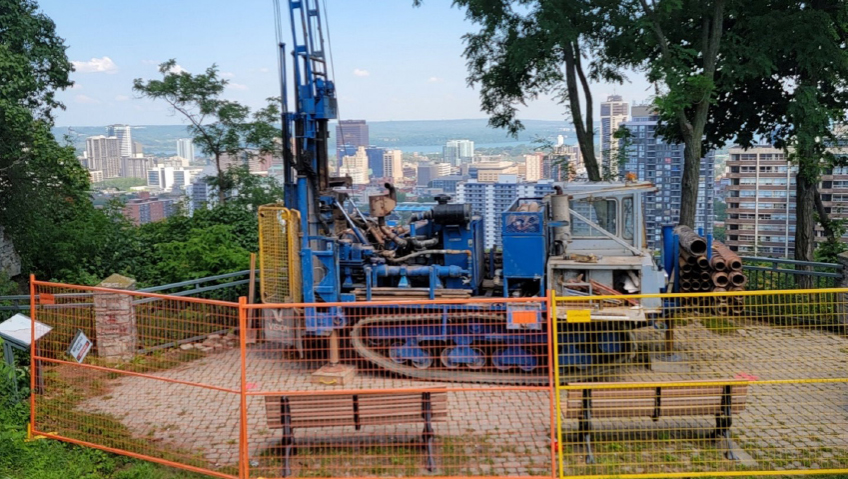Geo-Environmental Drilling Inc. (GEDI) is a drilling company unlike any other in its field. Founded over thirty years ago, and based in Halton Hills, Ontario, it has earned a reputation for high quality services and safety standards.
The company provides, but is not limited to, Geo-technical, Environmental, and Hydro-geological drilling services throughout Ontario, using a variety of drill rigs mounted on truck and tracked carriers. Geo-technical drilling is a type of drilling that is performed as part of the construction process. This is mainly carried out for structures like buildings, bridges, cell phone towers, roads, city infrastructure, et cetera. Soil samples are retrieved by GEDI and analyzed by engineering firms. Data can also be gathered, via this soil sampling process, for environmental and hydro-geological purposes.
When the groundbreaking ceremonies take place, drillers and Geo-technical engineers “don’t get the limelight like the architects and politicians do when they put the silver shovel in the ground,” notes Dave Gunn, GEDI’s Principal and Co-Owner. “But it’s the data that makes these things work,” Mr. Gunn adds, “whether it’s a water line being buried, a tunnelling project, or someone buying a $100 million piece of property, we have to make sure the data accurately represents the soil being tested.”
From conception to completion, GEDI is a one-stop shop for their clients. GEDI can assist with utility locates, daylighting operations, traffic control services, drilling services, water well services, and so much more. The company has a fabrication department in-house and can sustain itself when it comes to retrofitting rigs and building tooling. “We have been able to stay competitive, while offering a superior service, by performing most of the services ourselves,” says Mr. Gunn. “On large or specialized projects, work is occasionally partnered with trusted third parties.”
Before the company’s inception, Mr. Gunn was once employed as an Environmental, and Geo-technical, technician. It was then he and his business partner Ron Barnhardt, who also worked for the same firm, launched GEDI back in 1991 in response to a lack of good health and safety work practices and low customer service within the industry.
“At the time,” says Mr. Gunn, “health and safety, and customer service, were almost non-existent.” With Mr. Gunn’s knowledge of soil sampling data and Mr. Barnhardt’s drilling systems and mechanical knowledge, Geo-Environmental Drilling Inc. was born.
In its infancy, GEDI mainly performed soil investigations and installed remediation equipment for energy companies such as Imperial Oil and Shell Canada, who Mr. Gunn speaks highly of by praising them for their “unwavering commitment to safety and professionalism.” Over time, the bulk of GEDI’s work shifted from the energy sector to the construction industry.
Today, their workload is more or less evenly divided between geo-technical and environmental drilling. “People are buying land to build on,” begins Mr. Gunn, “and an environmental assessment is required when dealing with the banks. Then, before they build on the land, a Geo-technical investigation has to be completed. When the refinancing needs to be done, ten years later, the banks want to make sure the soil isn’t contaminated. It isn’t uncommon for us to drill a site numerous times over the decades.”
So, what sets GEDI apart from other drilling firms?
Mr. Gunn attributes GEDI’s success to the quality of their overall service, their relationships with their clients and employees, and the production of accurate data for the engineering firms that hire GEDI. “Everyone here is concerned with our client’s next drilling project,” he states. “Our goal is to safely, and efficiently, complete a client’s drilling program within the time and budget estimated. We need the engineers to be successful in their business so we can perform their next job.”
But doing a great job for its clients isn’t the only contributing factor to GEDI’s success.
Geo-Environmental Drilling is very proud of its environmental safe-work practices. Mr. Gunn says,” there are many small tasks and practices that have to be completed for a job to be successful—proper handling and disposal of waste and running newer, well-maintained equipment,” to name a couple. These practices cannot be implemented properly without the employees.
GEDI, currently, employees 35 to 40 employees and is always looking for good people to join their team. Mr. Gunn explains what he looks for in a new hire: “We are looking for someone who is willing to learn, wants to advance, and is able to follow policies and procedures. We can train them to do everything else.”
According to Mr. Gunn, it usually takes three to five years to go from a green horn driller’s assistant to a fully licensed driller. This journey includes new employee orientations, on-site training, stringent health and safety training, an operator training program, well licensing training, MOE training, a driver training program, and most importantly, the hard work and dedication in providing an unparalleled drilling service.
Of course, there are benefits to maintaining a high level of qualified staff and services. Mr. Gunn says he has never advertised because he been able to rely on word of mouth, referrals, and repeat customers to obtain work. This strategy has been successful for GEDI. Some of its past projects include the Gordie Howe Bridge spanning the Detroit River in Windsor, Ontario; the Port Lands Toronto project, which will be a revamped waterfront at the bottom of the Don River; and numerous transit infrastructure projects for Toronto, Hamilton, and Mississauga.
“All of our projects are important,” Mr. Gunn states. “The Gordie Howe Bridge required a great deal of preparation in case artesian conditions were encountered within the bedrock formation. Other projects require us to accurately drill and sample to depths of 150 meters. Some projects require us to deal with potential contamination, traffic control, homeowners, tenants, civilians et cetera.” Some projects are also sensitive because of nearby buried utilities.
GEDI operates a subsidiary, Geo-Daylighting, responsible for exposing the buried services so they are not damaged during the drilling process. The day-lighting process consists of a large truck equipped with an “Air-Knife” system that uses high-pressure air to safely break apart the soil around the services while simultaneously containing it in a large holding tank via a high volume vacuum system. This system ensures that buried facilities aren’t damaged, but more importantly, that no one is hurt during the drilling process because of a utility strike.
GEDI is partially responsible for raising the standards in the industry over the past 30 years. In the early 1990s, when Mr. Gunn worked for a consulting firm, drill crews wore shorts and running shoes on site. Although this made for good backyard barbecue attire, it didn’t protect the worker from heavy equipment or potentially contaminated soil. By contrast, Geo-Environmental Drilling has always taken a “safety first” approach to its operations.
GEDI performs numerous on-site safety audits and safety meetings to make sure all safety protocol is being followed, not only by its employees, but its clients too. In addition to maintaining their tools and equipment, GEDI reinforces the “safety first” approach through their safety culture and mentoring programs. This safety culture is ingrained in everyone’s minds through constant encouragement for employees to speak up if they come across any safety concerns. Mr. Gunn believes it is this type of transparency and awareness that helps GEDI overcome unforeseen challenges such as the COVID-19 pandemic.
“The initial stages of COVID-19, in early 2020, were scary for everyone,” he says. “We dealt with these stages within the company in several different ways. We had daily morning meetings to discuss the virus’ progress. We tried to figure out what was false information on social media and countered that with what we hoped was correct advice.” While GEDI remained open for business throughout the pandemic, as a designated essential service, it did have to get creative with how to keep its employees, and the public, safe.
“Despite the government assistance, and continuance of drilling,” he says, “we did have to absorb some additional costs due to COVID-19 procedures. We had crews driving in separate trucks and we staggered morning start times to reduce employee contact,” to list a couple. Despite the challenges, Mr. Gunn is very proud of the company’s past and is excited about its future.
Geo-Environmental Drilling will continue to find ways to enhance its products and services. “My main goal,” says Mr. Gunn, “has been and will always be to have Geo-Environmental Drilling synonymous with high quality work and unparalleled commitment to the health and safety of all its employees and the people who hire us.”






